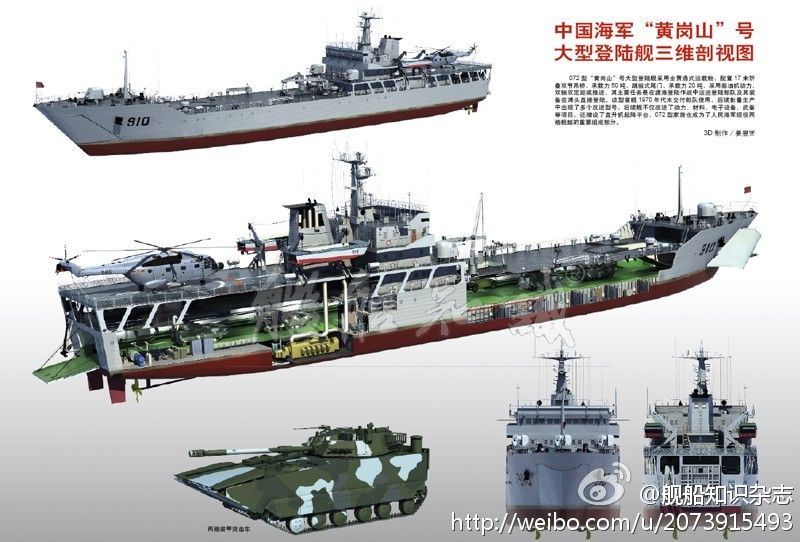The People's Republic of China (PRC) made headlines in two major ways this weekend: for making the first soft landing on the moon in 40 years, and for nearly causing a collision with the USS Cowpens in the South China Sea. The first is cause for a hearty "congratulations," the other is cause for a healthy degree of concern. A number of news outlets are reporting that a People's Liberation Army Navy (PLAN) vessel--suggested at this time to be of a Landing Ship, Tank (LST) variety--cut across the bow of the Ticonderoga-class cruiser USS Cowpens, forcing the Cowpens to take drastic evasive maneuvers. This incident was purpose-designed to force action by the US naval vessel, in a scenario that seems eerily reminiscent of examples given in Thomas Schelling's classic book Arms and Influence.
For a little background, the PLAN Type 072 LST is a lightly armed surface vessel, and displaces just shy of 4200 tons. Here's a fun reference image (click to enlarge):
Meanwhile, the USS Cowpens (CG-63) is a heavily-armed guided missile cruiser that in the past has been tasked with defending a carrier air group, and displaces an average 9600 tons.
While this is not the first time the Cowpens has made headlines, this is certainly the most important. The Cowpens was shadowing the PLAN carrier Liaoning in the South China Sea. This action was possibly in response to the deployment of the PLAN flagship into the region after the controversial expansion of the PRC's Air Defense Identification Zone (ADIZ); more information can be found in my earlier post on the matter. The LST and the Cowpens were supposedly in direct radio communication when the LST deliberately cut across the Cowpens' path, forcing the Cowpens to commit to an "all stop" due to the proximity of the vessels (reported to be anywhere from 200~500 yards).
This incident represents an extremely stupid game of chicken when initially viewed. An LST is not a primary surface combat vessel, and the PLAN is in the process of naval modernization--indicating that the PLAN vessel may have also been relatively obsolete, in addition to going up against a heavily armed primary combat vessel over twice its size.
This incident does not seem to have caused any further alarm on the part of either nation's fleet, and certainly did not escalate into a shooting war. Thank goodness, because there hasn't been a large-scale conventional war between nuclear-equipped adversaries since the end of the Cold War. However, this incident expands well on a number of Shelling's lessons, especially those concerning nuclear weapons and their enhancement of risk, and the theory of compellance. According to Schelling (and logic), if there was a conventional war between nuclear adversaries, there could always arise the temptation to let fly some canned sunshine. This concern would only be magnified in an exchange with the PRC when it is remembered that during the Cold war they had contingency plans for how to fight, win, and survive a nuclear war.
The absurd naval game of chicken, meanwhile, plays perfectly into an example given by Schelling about the theories of deterrence, compellence, and why such things matter in the long run. Compellence is generally understood to be the ability to make people do things. Deterrent threats are passive, and compellent threats are active. An example in Arms and Influence revolves around the game of chicken itself; it is illustrated when someone is charging headlong, and the opponent knows that they must react in order to avoid catastrophe and utter disaster. This only works if one of the "players" in the game of chicken makes a deliberate move that would otherwise be known to cause disaster--which can work well if one of the sides is horribly outmatched (like a small LST challenging a guided missile cruiser). This only works if there is uncertainty involved, which plays well into the opacity of the PRC and PLAN's general modus operandi.
In the South China Sea, an outmatched LST was able to compel the USS Cowpens to literally stop what it was doing. This is a perfect modern example of compellence that mirrors Schelling, and it isn't a good thing. Schelling proceeds to expand on how the international game of chicken works well to give a nation a read on how opponents may act in the future to similar aggression. In this instance, a PLAN LST captain used incredible aggression to bring about a change in course and speed of a USN vessel, even though the Cowpens was well within her rights in international waters. While this incident ended peaceably, Schelling points out that there is always a risk that one side or the other may be confused about how far they're "invited" to go in the "game." It will be interesting in the future to see if the PRC will consider the December 5th incident as an isolated encounter, or if they will take it as a read on US resolve when faced with Chinese aggression in the future.
So why did the chicken cross the road?
Time will tell, but maybe it wouldn't be a bad idea to read Arms and Influence in the meantime.



1 comment:
Top speed Yuting class LST = 18 knots, the Cowpens can almost double that. It's like saying a buoy stopped a powerboat. It absolutely isn't possible to interfere with Cowpens unless Cowpens maneuvered into position specifically to allow it to happen. Ever see that Austin powers steamroller scene? It's like that. "Oh no! That really slow ship is going even slower!" How could that possibly make the ship harder to miss. They're all jogging around trying to mess with Lioning and the LST didn't just appear out of the fog.
No one does brinkmanship like the US, we freaking invented Hollywood and you fell for it just like the Chinese.
Post a Comment